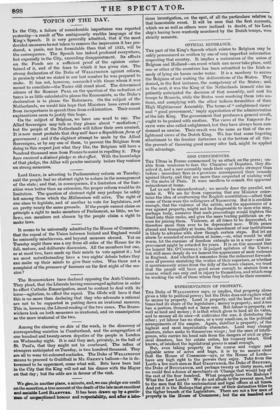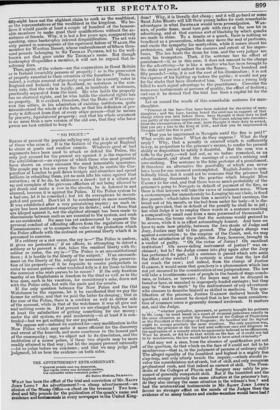REPRESENTATION OF PROPERTY.
THE Duke of WELLINGTON says, or implies, that property alone gives a title to political power; but the Duke does not explain what he means by property. Land is property, and the land has at all times had its share of the legislature ; money is property, and it too has a portion, though not a large one. But labour is property, as well as land and money; it is that which gives to land all its value, and to money all its uses—it cultivates the one, it distributes the other; yet labour has no share, or a very small one, in the political arrangements of the empire. Again, intellect is property, of the highest and most imperishable character. Land may change masters, riches make to themselves wings ; but the man of intelli- gence, who carries his head safe from the dangers of civil or phy- sical disasters, has his estate entire, his treasury intact. God knows, of intellect the legislatorial power is small enough. But, even taking property in the coarse and vulgar and palpable sense of acres and bags, it is by no means clear that the House of Commons—aye, or the House of Lords— have any high right to the powers they enjoy. Take from the Lords a few such men as Earl GROSVENOR, the Duke of BEDFORD, the Duke of BUCCLEUCH, and perhaps twenty or thirty more, and we could find a dozen of merchants on 'Change that would buy all the rest of the four hundred. What property have the Bishops ? What the Law Lords ? We do not allude tothe present men, but to the men that fill the ecclesiastical and legal offices at all time& And yet it is the Bishops that give one of their distinctive titles to the higher branch of the Legislature. There are not a few men of property in the House of Commons; but the six hundred and misunderstood the whole of the facts, or that his definition of pro- slaughter.
is no more than a new version of the old one, that they who have charge which



























 Previous page
Previous page